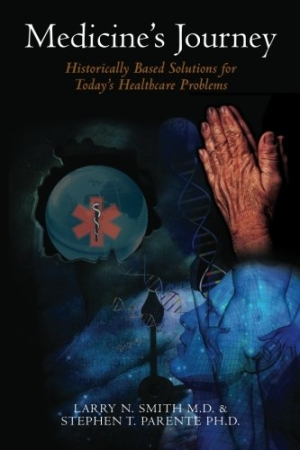Medicine's Journey Through Ignorance, Bigotry, Poverty, and Politics To America's Uninsured
Historically Based Solutions for Today's Healthcare Problems
Medicine’s Journey Through Ignorance, Bigotry, Poverty, and Politics To America’s Uninsured: Historically Based Solutions for Today’s Healthcare Problems is an in-depth analysis of America’s current health-care crisis. Larry Smith and Stephen Parente both draw upon their extensive experience in medicine, health care, and economics as they examine current trends and issues in the field of health care and offer potential solutions.
Smith and Parente describe the historical background of the issue at hand, spanning centuries and continents, to lay the foundation for an understanding of the modern health-care system. For example, they note, “Because of the work done by a Jesuit Priest in Peru in 1633, the bark of a tree was found to control the fever of malaria.” Such background contextualizes the discussion for readers and lends the authors credibility for their later arguments.
The authors do not shy away from firmly pointing out, in their opinions, the failures of today’s health-care system. They assert that “providing socialized medicine is not the answer.” Smith and Parente also offer substantial scholarly support and potential solutions for the problems they identify. For instance, “Standardizing cost-effective healthcare guidelines will help, although not cure, the marked regional differences in the cost of treating the same disease.” The authors suggest that national health testing standards, limiting the number of physician extenders in the medical marketplace, and more freedom for decision making within the private sector are all possible solutions to the current crisis.
The text is well edited, and the language and vocabulary are approachable but professional. The authors write, “As America’s competitive quality-driven model progressed, it became clear that every form of medical and paramedical organization was claiming the right to examine, diagnose, treat, and operate on the body.” Smith and Parente rely heavily, through their bibliography, citations, and references, on other authorities in the field. Doing so provides readers with assurance that the opinions offered are based in research and well supported.
There are a few drawbacks to the book. Toward the end, the generally objective and professional tone becomes more politicized as the authors capitalize the term “Left.” They make assumptions about different perspectives of the debate based on political affiliations. Although this may be a fair assumption, such labeling could potentially offend otherwise open-minded readers.
Overall, Medicine’s Journey provides readers with a fascinating and fresh perspective on today’s health-care crisis. Those most involved in the debate—practitioners, lobbyists, and policy makers—will benefit a great deal from this informative work. It is also an approachable and insightful read for any concerned citizen.
Reviewed by
Emily Adams
Disclosure: This article is not an endorsement, but a review. The publisher of this book provided free copies of the book and paid a small fee to have their book reviewed by a professional reviewer. Foreword Reviews and Clarion Reviews make no guarantee that the publisher will receive a positive review. Foreword Magazine, Inc. is disclosing this in accordance with the Federal Trade Commission’s 16 CFR, Part 255.

